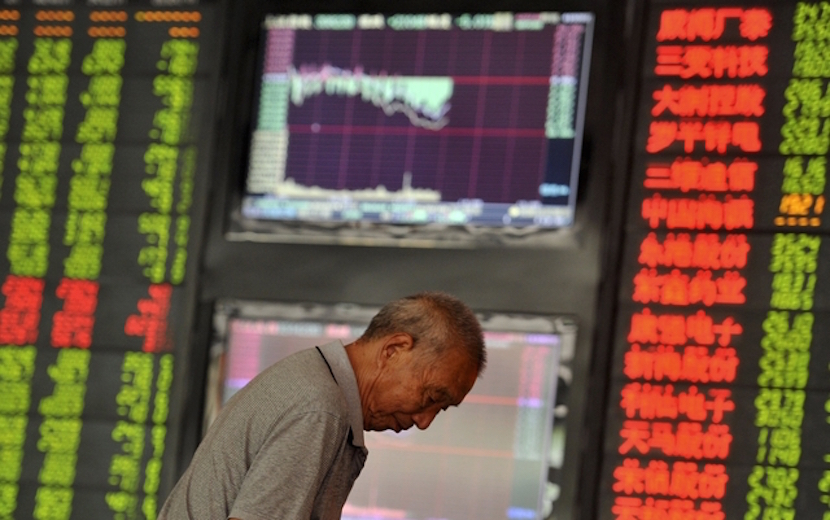A luta continua – but in this case victory is anything but certain. Another drop overnight has taken the Chinese stock market crash to 27% in three weeks, it’s biggest fall in 23 years. More worrying is that the country’s cash-rich central government has been powerless to stop the rout. Paradoxically, even greater panic is setting in after the Government’s efforts had little effect – and its regulator announced investigations into alleged price manipulations. So far the Hong Kong market has held up well despite the Crash in Shanghai. But given the close ties between the two markets, it has to be jangling the nerves of those exposed via Naspers, whose price surge has been directly proportionate to the ballooning of 34% owned HK-listed Tencent. – Alec Hogg

By Kyoungwha Kim
(Bloomberg) — The Shanghai Composite Index headed for its steepest three-week decline since 1992 as government measures to shore up Chinese equities failed to stop margin traders from unwinding positions at a record pace.
The benchmark gauge sank 3.3 percent to 3,785.57 at the midday break, extending its drop from a June 12 peak to 27 percent. Chinese shares have erased more than $2.8 trillion of value in three weeks, marking an abrupt end to the longest bull market in the nation’s history. Just 70 of the 1,106 stocks in the Shanghai Composite posted gains on Friday, paced by PetroChina Co. amid speculation of buying by state-backed funds.
With the Shanghai gauge tumbling more than twice as fast as any other index worldwide, regulators have pledged to investigate market manipulation and unveiled measures to revive confidence among the nation’s 90 million individual investors. The steps have so far been overshadowed by concern that leveraged traders will keep liquidating bullish bets after equity valuations exceeded levels during the country’s stock- market bubble in 2007.
“For now, the mood is verging on panic, and it is extremely hard to calm a bear who is in a rage,” said Bernard Aw, a strategist at IG Asia Pte. in Singapore. “Chinese brokers may still be looking at reducing their risk exposure by closing more margin debt.”
Futures Selling
The outstanding balance of margin debt on the Shanghai Stock Exchange dropped for a ninth day on Thursday, sliding to 1.29 trillion yuan ($208 billion) in the longest stretch of declines since the city’s bourse began compiling the data. A five-fold surge in margin debt had helped propel the gauge to a 150 percent advance in the 12 months through June 12.
Regulators have made late-night announcements almost every day since the benchmark index entered a bear market this week. The China Securities Regulatory Commission said Thursday it will investigate and “strictly” punish manipulation, while people with knowledge of the matter said the CSRC is examining recent short-selling activity for stock-index futures. The nation’s financial futures exchange has suspended 19 accounts from short selling for 1 month, Reuters reported, citing unidentified people with direct knowledge.
The Shanghai Composite has retreated 9.7 percent over the past five days. The CSI 300 Index declined 2.4 percent Friday, while Hong Kong’s Hang Seng China Enterprises Index slumped 1 percent and the Hang Seng Index dropped 0.2 percent.
The central bank cut interest rates over the weekend, while margin-trading rules were eased and trading fees were cut on Wednesday. Meanwhile, large-cap stocks have rallied amid speculation of buying by government-linked funds. PetroChina, the nation’s biggest company by market value, is up 11 percent this week.
IPO Pace
The government will do “whatever it takes” to restore investor confidence because fear would trigger forced liquidations and panic selling, Judy Zhang, an analyst at BNP Paribas SA in Hong Kong, wrote in a note dated Friday. It may slow the pace of initial public offerings or cut the stamp tax, she said.
Subscriptions for 28 IPOs are estimated to lock up 4.03 trillion yuan ($650 billion) from Friday through next week, according to a Bloomberg survey.
Gauges of industrial and utility companies in the CSI 300 slumped at least 4 percent, the worst performers among 10 industry groups along with energy, after doubling over the past year. China Eastern Airlines Co. plunged 10 percent for a second day after applying to sell shares in a private placement. Huaneng Power International Inc. fell 8 percent for a three-day, 25 percent loss.
China’s services Purchasing Managers’ Index dropped to a five-month low in June, a private gauge showed Friday.

